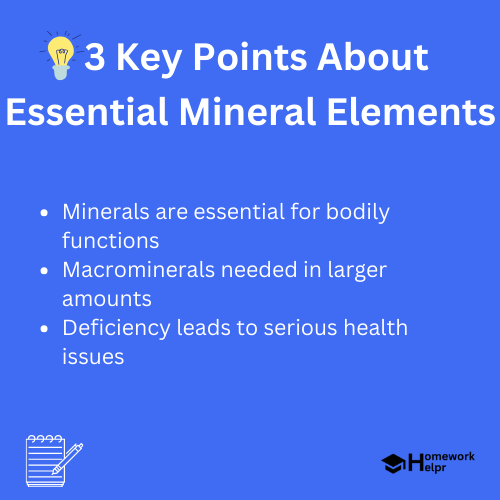📝 Summary
Minerals are inorganic substances essential for human health, playing vital roles in various physiological processes like maintaining strong bones and nerve transmission. They are classified into macrominerals, such as calcium and phosphorus, required in larger amounts, and microminerals, like iron and zinc, needed in trace amounts. A deficiency in these minerals can lead to health issues like osteoporosis and anemia. Understanding their functions, sources, and the importance of a balanced diet can significantly improve overall health and prevent deficiencies.
Essential Mineral Elements
Minerals are inorganic substances that are essential for the proper functioning of the human body. They play vital roles in various physiological processes, including maintaining strong bones, transmitting nerve impulses, and ensuring metabolic pathways function smoothly. In this article, we will explore the essential mineral elements necessary for our health, their functions, sources, deficiency effects, and much more!
What Are Essential Mineral Elements?
Essential mineral elements are classified into two main categories: macrominerals and microminerals, depending on the quantity our body requires. Macrominerals are needed in larger amounts, while microminerals are needed in trace amounts.
- Macrominerals: This category includes calcium, phosphorus, magnesium, sodium, potassium, and chloride.
- Microminerals: This category includes iron, zinc, copper, manganese, iodine, selenium, and molybdenum.
Definition
Inorganic: Compounds that do not contain carbon-hydrogen bonds.
Trace: Referring to very small amounts of a substance.
Examples
1. Calcium and phosphorus are vital for bone health and development.
2. Iron is crucial for blood production and transportation of oxygen.
Importance of Essential Minerals
Essential minerals play a multitude of functions that support our health. They aid in various biochemical reactions and are necessary for critical bodily processes, which include:
- Building bones: Minerals like calcium and phosphorus are key for bone density.
- Nerve function: Sodium and potassium are crucial for transmitting electrical signals in the body.
- Muscle contraction: Magnesium and calcium play a significant role in muscle contraction and relaxation.
Additionally, these mineral elements assist in the production of hormones and enzymes that are vital for metabolism. Without sufficient minerals in our diet, our bodies can become susceptible to various diseases.
Key Essential Minerals & Their Functions
Now, let’s delve deeper into some of the key essential minerals and their specific roles in our body:
- Calcium: It is crucial for strong bones and teeth. It also plays a role in blood clotting and muscle contraction.
- Iron: This mineral is a vital component of hemoglobin, which carries oxygen in the blood. It also supports energy production.
- Zinc: An essential mineral involved in immune function, DNA synthesis, and wound healing.
- Iodine: Vital for the synthesis of thyroid hormones, which regulate metabolism.

Sources of Essential Minerals
We can obtain essential minerals from various dietary sources. Here are some rich sources of specific essential minerals:
- Calcium: Dairy products, leafy greens (like spinach), tofu, and almonds.
- Iron: Red meat, beans, lentils, and fortified cereals.
- Zinc: Meat, shellfish, legumes, and seeds.
- Iodine: Seafood, dairy products, and iodized salt.
Incorporating a balanced diet that features these foods can significantly improve mineral intake and overall health.
❓Did You Know?
Did you know that the body contains about 25 different minerals, and they make up about 4% of your body weight?
Deficiency of Essential Minerals
A deficiency in these essential mineral elements can lead to a variety of health issues and compromised bodily functions. Here are a few examples of what happens with a lack of certain minerals:
- Calcium deficiency: Can lead to osteoporosis, a condition characterized by weak and brittle bones.
- Iron deficiency: Results in anemia, which can cause fatigue, weakness, and a reduced capacity for physical activity.
- Zinc deficiency: Can impair the immune system and slow down wound healing.
- Iodine deficiency: May lead to goiter, an enlargement of the thyroid gland, and can cause various thyroid-related issues.
Definition
Osteoporosis: A medical condition where bones become brittle and fragile.
Anemia: A condition characterized by a deficiency in the number or quality of red blood cells.
Getting The Right Balance
While it is essential to consume these vital minerals, moderation is key. Too much of certain minerals can lead to toxicity rather than health benefits. Here are a few guidelines to help maintain a healthy balance:
- Be mindful of moderation. For instance, excessive calcium can lead to kidney stones.
- Consider supplements only if you have a known deficiency and have consulted a healthcare professional.
- Eat a variety of foods to ensure you receive all necessary minerals.
Regular health check-ups can also help in monitoring mineral levels in your body, allowing you to adjust your diet accordingly.
Conclusion
In conclusion, essential mineral elements are crucial for maintaining optimal health and well-being. By understanding the different types of essential minerals, their roles in our body, sources, and how to prevent deficiencies, we can better appreciate the significance of nutrition in our daily lives. Striving for a balanced diet that includes a variety of mineral-rich foods can help us lead healthier, happier lives. Always remember, knowledge is power when it comes to your health!
Related Questions on Essential Mineral Elements
What are essential mineral elements?
Answer: They are vital minerals for human health
What are the two types of essential minerals?
Answer: Macrominerals and microminerals
What can cause deficiencies in essential minerals?
Answer: Inadequate diet and absorption issues
What are good sources of essential minerals?
Answer: Dairy products, meat, and leafy greens
